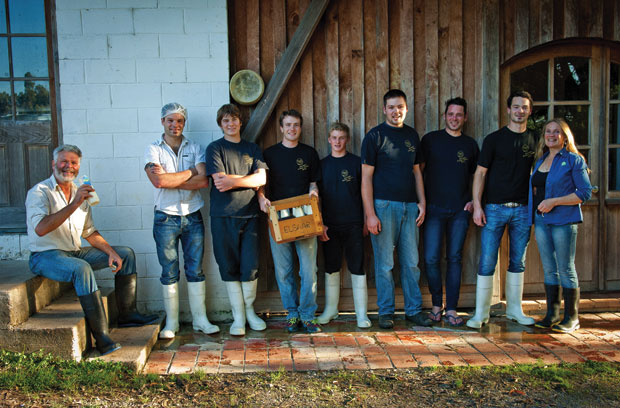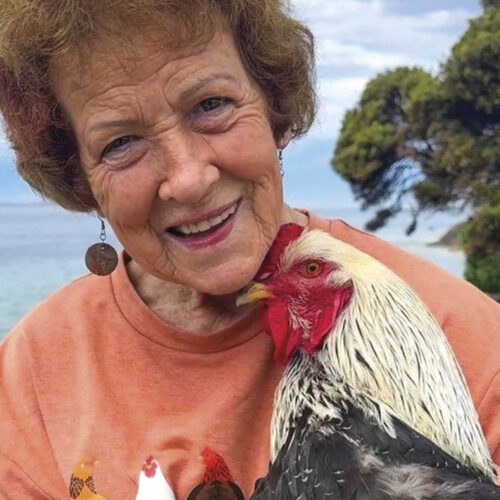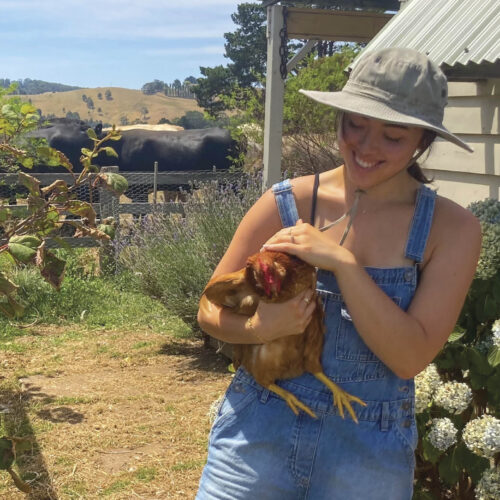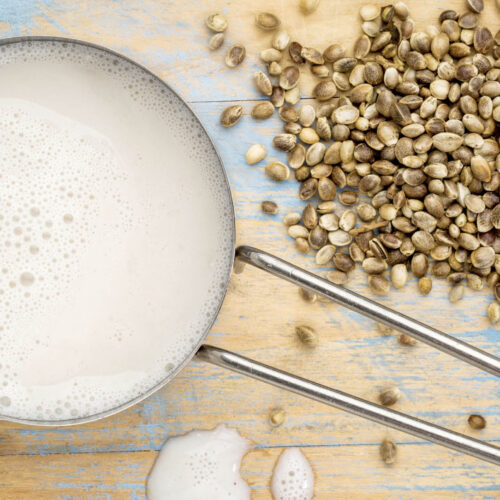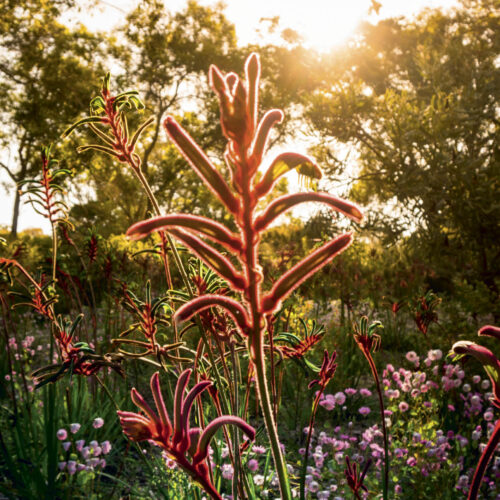Milk in the veins
2011-08-02T00:49:54+10:00
Elgaar Farm is a pioneering family dairy and cropping farm that has been paving the way in organic and sustainable practices for almost 25 years. HELEN CUSHING visits this Tasmanian treasure.
“We have a holiday on the farm every day,” says hard-working organic farmer Josef Gretschmann with a broad smile. Milking 300 cows a day, raising six children, operating an award-winning dairy factory and growing 50 hectares of grains is not what most people call a holiday. However, Joe and his wife, Antonia, are not like most people, and their farm is not like most farms. Elgaar Farm, tucked away down a back road in northern Tasmania’s rich dairying country, is an iconic organic brand in southern Australia, which cannot meet the demand for its products.
“I grew up in a farming village in Bavaria,” says Joe. “The farm had been in my family since the 1450s. The eldest son always inherited the farm. I was the eldest son. I was born in the farmhouse. I have milk flowing in my veins, not blood!”
Antonia was from Munich but always knew she wanted to live in the country. Her family used to holiday in Joe’s village. They met, married and settled into farming life together, both having studied agriculture. Joe had also trained as a carpenter and joiner, explaining that traditionally farmers learned a trade as well, “so everyone in the community had a skill which could be shared”.
“We did dairying and cropping and built a small cheese factory,” says Joe. “We had both been taught that modern agriculture needs chemicals. I used to sit on the tractor spraying atrazine [a chemical herbicide] without protective clothing and it would blow all over me.”
A new philosophy is born
In 1979 Antonia became pregnant and they started to question the use of chemicals. “We began researching sustainability and conventional farming,” explains Joe. “We looked into what happened to chemical residues, into plastic transfer from packaging to dairy foods. ‘Is it healthy?’ we asked. We realised it wasn’t.
“We decided to stop using chemicals. With our understanding of plant growth, soil science and animal husbandry we used our scientific knowledge to develop an organic system.”
The Gretschmanns wanted a zero-input system, whereas many organic producers depend on off-farm inputs for soil fertility, pest and disease control, and animal health. They researched a number of different approaches, incorporating ideas that fitted in with their philosophy of ecologically, economically and socially sustainable farming. After some initial difficulties, the balance gradually returned and the farm ecology naturally stabilised.
It was not long before the Gretschmanns met other concerned and like-minded people – both academics and farmers. “In 1983 we set up Naturland, an organic support organisation,” says Joe.
“I was the president. We held a public launch, expecting about 50 people. The hall kept filling until there were about 300 people. I was in a state of shock and couldn’t speak!”
Naturland is now one of the largest organic certifiers and support networks in the world with around 53,000 members internationally. In Bavaria alone, 68,000 hectares of farmland is certified organic by Naturland (Bavaria is a state in Germany).
Despite the family ties and love of Bavaria, Joe and Antonia left the ancestral farm in 1986 (it remains in the family) and headed to Australia with a vision to develop their own farm from scratch and to contribute to a new organic industry.
“We came [to Australia] under the business immigration program,” says Joe. “We submitted a detailed business plan and spent eight weeks touring dairying areas south of Sydney. I definitely didn’t want to live on an island, but somehow we ended up on the boat to Tasmania. We arrived in Devonport on a superb day in May, had a picnic at Mt Roland and fell in love with the area.”
The Gretschmanns settled with their four children on Elgaar Farm – a 106-hectare property with a permanent creek, springs, dams and soil that was good for cropping and dairy farming. The lifestyle in the area was also part of the appeal. “Deloraine is a good town,” says Joe, referring to the nearby regional centre. “It has interesting people, arts, yoga, aikido. We knew exactly what we wanted, and it was here.”
Going organic
The process of converting the property to organic began immediately. From 1986-88, 35,000 trees were planted, creating ‘shelter-belts’. “These are essential for ecology,” says Joe. “They have a role to play in an organic system; their roots transport nutrients from the deep soil, the leaves then blow onto the paddocks bringing these nutrients. Wind reduction lowers evaporation [and] there is shade and shelter for the cows – there are many benefits.”
The Gretschmanns believe that 20-25 per cent of every farm should be planted with shelter-belts and that this level will increase overall productivity. The layout of Elgaar Farm is based around its shelter-belts, with 35m-wide paddocks divided by 2 to 3m-wide fenced, unmown shelter-belt strips.
“This is where the pest controllers live,” Joe observes fondly. “It’s a habitat strip – bandicoots control pasture pests and there are many different birds and beneficial insects like ladybirds and ragwort beetle.”
The plantings include a wide range of native species plus 2500 walnut trees. The walnuts also have other roles to play in the organic system as they repel flies and will eventually be another cash crop. “There are no flies under them, so this is where the calving happens. Last year we collected a few baskets of walnuts – our first harvest,” says Joe.
Tagasaste (tree lucerne) hedges provide fodder for the cows and the bees from Elgaar’s two hives. The hives supply the family with honey while the bees service the farm. Hawthorn hedges are evolving as birds drop seeds along the fence lines. While other farmers may view this as a problem, at Elgaar it is seen as a gift from nature. Hedges are being planted for free while they do other work.
Diversity and resilience
The farm layout also allows ‘cell grazing’, in which the cows are moved every 12 hours. “A cow is a moving animal,” explains Joe. “It doesn’t graze where it has been before, it goes forward. After milking they are returned to a new paddock.”
The grass is never eaten down too short, which means root growth is deeper and pasture growth is stronger. It also means no rabbit problem, as rabbits like short grass. “This is in line with the philosophy of Masanobu Fukuoka – encourage what you want and discourage what you don’t.”
Plant diversity in the pasture is vital to the organic system. “When we came here there were two or three species in the pasture. Now there are about 28,” says Joe, explaining that this is good farming for many reasons. “We use plants to penetrate the soil. We let them mature by not overgrazing, and the deep roots of species such as chicory bring nutrients to the surface while making channels which take organic matter, water and air down deep.”
While some organic systems advocate deep ripping of the soil, the Gretschmanns leave it to the plants. They do some shallow cultivation but no soil inversion. Irrigation is also kept to a minimum on Elgaar Farm, to further encourage deep root systems, increasing drought resistance.
The pasture species include herbs such as self-heal, yarrow, chicory, shepherd’s purse, fennel, dock, horehound, nettle, plantain, dandelion, chamomile, various clovers and other legumes and grasses, giving the cows a nutritious and medicinal banquet.
While some cows on conventional dairy farms have many health problems, Elgaar cows have virtually none. Most farmers expect 20 per cent of cows to have mastitis each year. At Elgaar it’s more like 0.5 per cent, and last year there were no cases of mastitis.
Ailments are treated homeopathically and the vet is rarely needed except during an occasionally difficult birth. “If the whole system is out of balance the immune system is weakened, but our ecology is in balance. The minerals and nutrients are there and the farm is healthy,” says Joe.
The cows are also happy. The usual stresses of being a farm animal just don’t exist at Elgaar. Calves are not separated from their mothers, and heifers are allowed to mature longer than in normal agricultural practice before becoming pregnant.
Elgaar cows go through their whole life cycle on the farm and all are given names. They are born, live, breed, give milk, retire, die naturally and are buried in this environment of love, respect and care. While the average life expectancy of a conventional dairy cow is about six years, Elgaar cows average 16 years, with some living much longer.
“You can’t have a cow for 10 years of milking and then send her to the abattoir,” says Joe with feeling.
Organic grains
There are 50 hectares of grain and seeds grown for human consumption, with any leftovers going to the cows. Standing thigh deep in flowering red clover, Joe and Antonia are completely content with their lot. Clover seed is sold to other farms, lucerne is for alfalfa sprout seeds, and malt barley for brewing, while rye, oats, spelt, wheat and linseed are grown for general use. Seeds are saved for the next season and grown according to a crop rotation plan.
Multitudes of cabbage white butterflies dance above the flowering lucerne. “They are weed controllers,” says Joe. “They keep down the wild radishes and mustards.”
In the distance the bulky silhouette of Mt Roland and the dramatic ridges of the Great Western Tiers wrap around the horizon. Plump heads of ripening barley and spelt glow in the warmth of Tasmania’s late afternoon autumn light.
“A farm should be somewhere you enjoy going out into,” says Joe. “That’s been forgotten. It should be an environment you like to be in – comfortable, peaceful, symbiotic, easy.” Elgaar is certainly such a place.
Next generation
The next generation agrees, with four out of five sons employed on the farm, supporting nine grandchildren between them. Son number five, aged 16, is still at college, and the only Gretschmann daughter lives in Hobart. Between them they take care of the workshop and cheese factory management, accounting and the website.
While other farmers have trouble attracting apprentices, Elgaar has four (including one of their sons), plus two drivers doing deliveries in Tasmania and Melbourne. There are no middle-men or distributors. The organic milk and cream, which is sold in returnable glass bottles, is on the shelf within 24 hours of milking.
All the milk is processed on site in a Bavarian-style factory complete with a wooden antique Bavarian butter churn. The zero-input philosophy extends to the factory with all ingredients produced on site, even the cheese cultures. Yoghurt is also packaged in returnable glass and has no additives, while handmade cheese rounds mature in the cellar.
“We learned from the old Bavarian cheese-makers when the little factories were closing down,” recalls Joe. The cheeses are naturally ripened and naturally rinded. The flavours vary according to the seasons: cheddar, parmesan, mozzarella, fetta, mascarpone, quark and bergkäse (a Bavarian mountain cheese) are all made.
Back to basics
This abundant farm is kept fertile with cow manure and good land management. One application of dolomite and lime was used 25 years ago to correct the pH, which had become acidic due to years of nitrogen and superphosphate fertiliser applications. There are no pests or diseases and production is above average.
Why isn’t everyone farming like this? Joe is philosophical on this point, saying 600 years of farming ancestry has given him an innate understanding and respect for farmers.
“Farmers are incredibly resilient,” he says knowingly. “They can handle enormous setbacks. They will stay and stay. This quality also means they are slow to change. They will watch and wait to see what happens in the long run.
“The products we make here are from this earth, this soil, these plants. Cows are living things, pastures are living things. In the dairy industry we are considered to be at the cutting edge. In the future we aim to be self-sufficient in bio-fuels. The residue will be used for feed.”
Joe and Antonia have done all they set out to do and more, with Antonia recently qualifying as a yoga teacher. In a world beset by stresses and strains, Elgaar is home to contented cows, a vibrant landscape pulsating with life and peaceful, fulfilled people.

